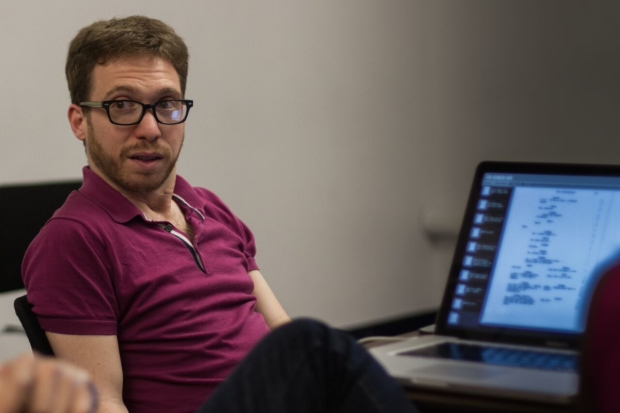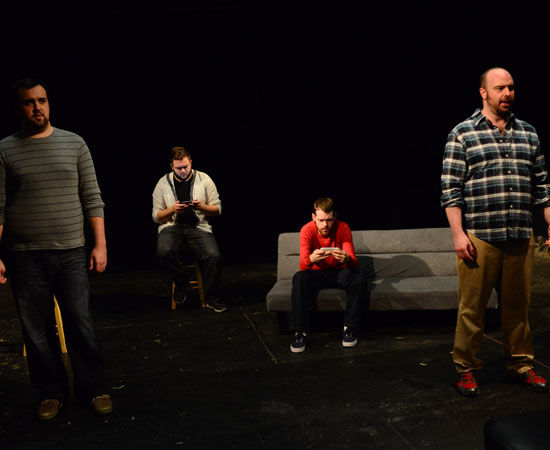A successful young director-playwright, Michael Perlman studied at Brown University and now lives and works in New York. His most recent play, At the Table, just closed to critical acclaim in New York. Perlman’s first play, Flying on the Wing (2006), won the Outstanding Solo Show award at the New York Fringe Festival in 2013. It was followed by the award-winning drama, FROM WHITE PLAINS, which became an instant success in 2012. Directed by Rich Rubin, it will be performed in Philadelphia as part of Gayfest! 2015, withFrank Schierloh as Dennis, Thomas-Robert Irvin as Ethan, Jeff Hunsicker as John, and Connor Feimster as Gregor.
Written in collaboration with Craig Wesley Divino, Karl Gregory, Jimmy King, and Aaron Rossini, FROM WHITE PLAINS shows role reversal at work. It follows the impact of negative childhood experiences that carry over into adulthood. Dennis, the protagonist, speaks up for his best friend who had been bullied into suicide. In publicly castigating Ethan, a homophobic bully from his youth, Dennis becomes an angel of revenge—a modern bully who preaches from the Oscar pulpit via his acceptance speech. This act has consequences for everyone. The play won critical acclaim and was presented with the GLAAD Media Award for “Outstanding Theatre Off-Off Broadway.” [Plays & Players Skinner Studio, 1714 Delancey Place] August 11-22, 2015; quinceproductions.com.

Flying on the Wing
Henrik Eger: In 2006, you wrote an autobiographical one-man show, both thought provoking and entertaining. In her NY Theatre review of your play and your performance, Maggie Cino presents this moving account: “Perlman’s small physical size and his hoarse, unusual voice are explored again and again. He stands on boxes and acts out scenes with tiny figures that make him look gargantuan, he drinks water to soothe his scarred vocal chords, conducts the sound of the hospital machines, and lip synchs with heartbreaking nuance.”
Michael Perlman: I wrote Flying on the Wing, probing into what about my life story was worth sharing. What the play ended up being was an exploration of whether or not everything happens for a reason, and, essentially, how what I faced were not adversities, but simply the experiences of my specific life. I wrote the play ten years ago, so it feels like a very different place in my life and my work.
Eger: Cino concludes her review of you and your work with these observations: “Perlman has won his battle. [. . .] Ultimately, the show is about how love does make a difference, and how life is a choice, and how at the intersection of love and life is the possibility for genuine transformation.” Could you talk about how transformation fuels your work?
Perlman: We go to the theater to see change and to be changed. Underlining all theatrical work is the possibility of transformation—and the story is whether or not that transformation happens. All my work starts from this notion: do these circumstances allow for change? In From White Plains, the characters desperately want to change and are searching for how to make that possible.

Scheduled before it was written
Eger: How did FROM WHITE PLAINS come into existence?
Perlman: When we were looking for a new play to do with Fault Line Theater back in 2012, a few possibilities fell through. I [then] got the idea of FROM WHITE PLAINSandoffered them to write that play. We had a workshop production that June—with an opening night scheduled before the play was written.
Eger: That sounds risky.
Perlman: It went well. We decided to do it again in a larger scale production.
Eger: Looking at the plays that you have written, how helpful was the workshop approach and the feedback from others?
Perlman: The workshop approach is invaluable to me. It is the only way I know how to write. I can write plenty on my own. In FROM WHITE PLAINS, for example, I came to the first rehearsal with a much simpler version of the ending that was not nearly as emotionally complicated. The feedback I got was to make it more emotionally complicated—so I went home that night and reworked it.
I write for—and sometimes with—the ensemble, using their voices and feedback to guide where the play goes. All of my plays are written for specific actors and for their specific skill sets.
Eger: Tell us more about your process of collaborating with actors.
Perlman: I did a few playwriting programs when I was a teenager—through The Playwrights Center in Minneapolis and Young Playwrights, Inc. in New York. As I kept developing, I realized that I truly valued the rehearsal collaboration with actors and the big picture.
Eger: Did you ever experience any writer’s block?
Perlman: Yes. When I was facing writer’s block in FROM WHITE PLAINS, I would go to a Tumblr we created and find inspiration from what the actors posted. In some cases, stories people shared made it directly into my earlier drafts. [For example,] the telephone moments in FROM WHITE PLAINS came from an exercise I had given the actors.

“Can we truly become adults without facing what we’vedone to others?”
Eger: What was the driving force for you to write FROM WHITE PLAINS?
Perlman: I’m interested in exploring how we, as a country, seem more and more afraid of the gray areas between good and bad. Everyone coming [to a show] would believe they know that “Gay bullying is bad.” I wanted to choose a topic that explores how to make that [illusion] complex: What happens when it’s in our past? How do we hold on to it and honor our past? Can we truly become adults without facing what we’ve done to others? Can we move beyond what we’ve had done to us? And how do we move on?
Eger: Your play shows a shift of power that could well be a fantasy held by oppressed peoples. It hits a raw nerve with critics and audiences alike. What responses do you get from those who share with you that they were bullied, too?
Perlman: Many [share] their own stories and respond to Dennis’ line, “It’s not that I’m holding onto it, it’s holding on to me.” I hear a lot about that—about the limits of forgiveness. How what happens in high school still affects us throughout our lives. I also heard from people who were bullies, and how it offered a new perspective for them. I personally think people are hungry for nuanced conversations, and I think and hope that FROM WHITE PLAINS offers that.
GayFest! runs August 7-22, 2015, at Plays & Players Skinner Studio [1714 Delancey Place] and Studio X [1340 S. 13th Street]. AT THE FLASH runs August 11 (preview), 12 (opening), 15, 18, 20, and 22, at 7 PM. See quinceproductions.com for a full calendar of shows and check out all the Phindie GayFest! coverage.
